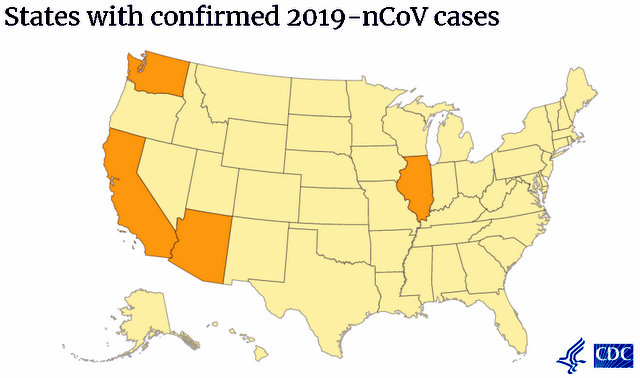Atlanta, CA…The Centers for Disease Control and Prevention (CDC) today confirmed additional travel-related infections of 2019 Novel Coronavirus (2019-nCoV) in the United States, this time in Arizona and California. These patients recently returned to the U.S. from Wuhan, China, where an outbreak of respiratory illness caused by a novel coronavirus has been ongoing since December 2019. This brings the total number of 2019-nCoV infections detected in the United States to five.
Based on the patient’s travel history and symptoms, healthcare professionals suspected 2019-nCoV. Clinical specimens were collected and sent to CDC, where laboratory testing confirmed infection with 2019-nCoV. Investigations are underway to determine where these patients went after returning to the United States and any close contacts who were possibly exposed. CDC teams have been deployed to support these efforts.
This is a rapidly evolving situation, and we are still in the early days of the investigation – both domestically and abroad. CDC continues to monitor the international situation with our teams on the ground in affected countries, as well as domestically in the four states with confirmed cases – Arizona, California, Illinois, and Washington. CDC is leaning forward with an aggressive public health response strategy and working closely with state and local public health authorities to identify potential cases early and make sure patients get the best and most appropriate care.
It is likely there will be more cases reported in the U.S. in the coming days and weeks, likely including person-to-person spread. In previous outbreaks with MERS and SARS, the two other coronaviruses that have jumped the species barrier to cause severe illness in people, person-to-person spread has been seen, including among healthcare workers caring for patients ill with coronavirus infection. This underscores the importance of appropriate precautions in the health care setting as well in homes of people who are infected with 2019-nCoV but who may not be hospitalized. CDC has developed guidance for both situations.
This is a very serious public health situation. We understand that some people are worried about this virus and how it may impact Americans. Outbreaks of new diseases are always of concern – and in today’s connected world, an outbreak anywhere can be a risk everywhere. Risk is dependent on exposure. Someone who is in close contact with a person who is infected with 2019-nCoV will be at greater risk of infection and should take the precautions outlined in CDC’s guidance for preventing spread in homes and communities. While this is a serious public health threat, CDC continues to believe the immediate risk to the U.S. general public is low at this time.
Right now, CDC recommends travelers avoid all nonessential travel to Hubei Province, China. In addition, CDC recommends people traveling to other parts of China practice certain health precautions like avoiding contact with people who are sick and practicing good hand hygiene. For the general public, no additional precautions are recommended at this time beyond the simple daily precautions that everyone should always take. It is currently flu and respiratory disease season, and flu activity is still high and expected to continue for a number of weeks. CDC recommends getting a flu vaccine, taking everyday preventive actions to stop the spread of germs, and taking flu antivirals if prescribed.
As we learn more about this novel coronavirus, we will continue to update our guidance. Please visit the CDC website, which is updated daily, for the latest information related to our response.



